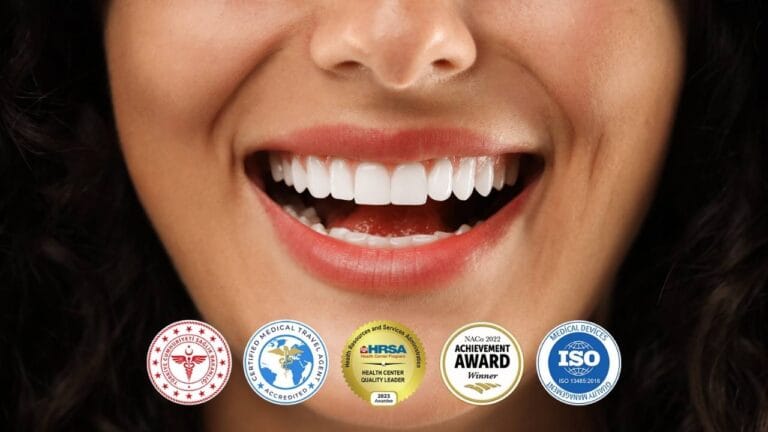Choosing Metal-free Zirconia implants in Turkey is the preferred path for patients seeking a dental restoration that aligns with a holistic philosophy or addresses specific metal sensitivities. As the global demand for biocompatible solutions grows, patients are increasingly looking beyond traditional titanium to avoid the aesthetic downside of the “gray gum line” while ensuring optimal soft tissue health.
Titanium vs. Ceramic: Understanding the Material
To understand the value of these implants, one must look at the chemistry. Zirconia implants are made from Zirconium Oxide (ZrO2), a material classified as a ceramic. Although zirconium is a metal in the periodic table, when converted to its oxide form, it becomes a ceramic crystal structure.
This transformation makes the material bio-inert, meaning it does not corrode, does not conduct electricity or heat, and does not trigger the same immune response that metals might in sensitive individuals. Crucially, scientific studies have proven that Zirconia creates a bond with the jawbone (Osseointegration) that is equivalent to that of titanium, providing a stable foundation for chewing.
Clinic Care Center: Expert Warning
While Zirconia is excellent for aesthetics and allergies, it has limitations. Ceramic is more brittle than titanium. It creates a ‘one-piece’ structure (implant and abutment are often fused), which means the surgeon cannot angle the abutment as easily. If you have very limited bone or need complex angulation, Titanium might still be the safer structural choice. We carefully evaluate your bite force; heavy grinders (bruxism) may fracture ceramic implants.
Titanium Implants vs. Zirconia (Ceramic) Implants
Understanding the trade-offs between metal and ceramic is essential for making an informed decision regarding your oral health.
| Feature | Titanium Implant | Zirconia Implant |
|---|---|---|
| Material | Metal (Grade 4 or 5 Titanium). | Ceramic (Zirconium Oxide). Metal-free and bio-inert. |
| Aesthetics | Dark gray. Can show through thin gums as a dark line. | White. Mimics natural tooth root color; invisible even with gum recession. |
| Allergy Risk | Low, but possible (Titanium sensitivity). | Hypoallergenic. Ideal for sensitive or auto-immune patients. |
| Strength | High elasticity. Rarely fractures. | High hardness, but brittle (can micro-crack under heavy pressure). |
| Design | Two-piece (Versatile for complex cases). | Often One-piece (Harder to place, requires precise bone volume). |
Why Gums Love Zirconia
One of the most significant advantages of Zirconia is its relationship with the soft tissue (gums). The surface of Zirconia is extremely smooth and has low surface energy. This results in significantly less plaque and bacteria accumulation compared to titanium. Furthermore, clinical observation suggests that gums maintain a healthy pink color around Zirconia because the white material allows for better light reflection and micro-circulation, avoiding the “tattoo effect” or gray discoloration often seen with metal implants.
Frequently Asked Questions about Ceramic Implants
Are they more expensive?
Yes. Zirconia implants typically cost 30-50% more than high-quality titanium implants. This is due to the complex manufacturing process of the ceramic material and the lower global supply volume.
Do they last as long as titanium?
Titanium has a track record of over 40 years. Zirconia implants have been in use for roughly 15-20 years. While current data shows excellent survival rates, titanium still holds the title for the longest-proven durability.
Can I have them if I grind my teeth?
We exercise extreme caution with patients who have severe Bruxism (grinding). Because ceramic has no elasticity, heavy grinding can cause the implant to fracture. In these cases, titanium is safer.
Is the surgery different?
Yes. Zirconia implants often come as a “monoblock” (one piece). This means the implant cannot be buried under the gum to heal; the top sticks out immediately. This requires strict protection from tongue pressure and chewing during the healing phase.
Can I do All-on-4 with Zirconia?
While technically possible, it is challenging. The All-on-4 technique relies on tilting implants to avoid sinuses, and Zirconia implants are less forgiving of these angles. Most surgeons prefer titanium for full-arch restoration.
Are they FDA approved?
Yes. Leading brands like Straumann (Pure Ceramic) and Z-Systems have full FDA and CE approval, ensuring they meet rigorous safety standards.
Biocompatible Beauty.
If you prefer a holistic approach to dentistry or suffer from metal sensitivities, Zirconia implants offer the perfect blend of strength and biology. At Clinic Care Center, we offer premium Swiss ceramic implants. Contact us today to see if you are a candidate for metal-free restoration.
Also Read:
Dental Implants
Smile Makeover
All-on-4 Dental Implants
Dental Crowns Zirconium
Dental Veneers



